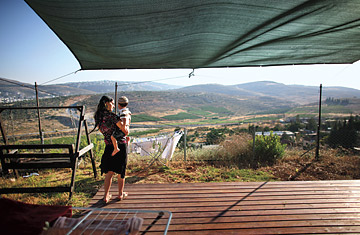
Jewish settler Einat a Bloch holds her neighbours son outside their home at the settlement of Shilo in the West Bank.
(3 of 3)
Plumbing and Powerful Men
For every Itay Zar (there are at least 100 hilltop settlements like his in the West Bank), there are thousands of Sharon Katzes in communities with plumbing and Little League. These suburban settlers make up the established West Bank colonies that Israel does not want to relinquish — in fact, would like to expand. So far, Netanyahu has not directly challenged Obama on the settlements, other than to say he won't stop "natural growth" (that is, houses for expanding families). Since the Israeli army is always skirmishing with radicals like Zar, giving up the occasional outpost is politically feasible, even popular. But challenging powerful men like Goldstein ("He has a lot of friends in America," former President Jimmy Carter told TIME on his way into a meeting with the mayor) and law-abiding citizens like Sharon Katz is another matter. Politically, it is not easy for Netanyahu to face down the settlers. But if he does nothing, Obama will have to confront the Israelis more directly than has any other President since George H.W. Bush, who threatened to refuse granting Israel $10 million in loan guarantees as long as the expansion of settlements continued.
In Israel, settlers from suburban towns to hilltop outposts alike express contempt for Obama. The U.S. gave $2.4 billion in aid to Israel last year, but Israel Katz says the cash does not entitle a U.S. President to "tell us how to live." He adds, "He is butting into another country's interests. I don't think Israel tells Obama what to do."
In the end, even if Obama continues to apply pressure, the solution to the settlement question will have to come from inside Israel. For many Israelis, the settlements are not a matter of ideology — they simply offer a cheap place to live for a growing population. Still others see no need for settlements at all. Two opinion polls in June had very different results. In one, 56% supported Obama's position; in the other, 56% opposed it. As the settlers build, tacitly assisted by the state, activists often campaign against them. "This is about the borders of morality. Do we want to rape 3 million people to obtain a national narrative?" says Dror Etkes, who works for an Israeli human-rights organization, Yesh Din, that challenges settlements in court. "The settlers are a small minority of strong militants. I don't think they will provoke a civil war, but I think disengagement will be the hardest trauma in Israel's history."
Sitting around their kitchen table, with grandchildren's plastic toys scattered on a deck beyond sliding-glass doors, the Katz family doesn't look or sound militant. Indeed, to American ears, their version of the national narrative sounds rather familiar. "I would love it that the little outposts someday have their own playgrounds and Little League," Sharon Katz says. "Israel shouldn't leave any hilltop! How did communities start out in the American West? With one log cabin. When we bought this land, it was a rocky hillside. Look what it looks like today."
— With reporting by Aaron J. Klein and Jamil Hamad/Jerusalem
